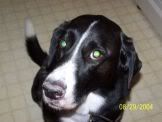Wednesday, May 21, 2008
The Lone Eagle
Today is the 81st anniversary of the legendary flight of the Spirit Of St Louis.
Being the aviation nut that I am, I'd be remiss if I didn't say SOMETHING about it.
Over the course of 33 hours and 30 minutes, Charles Lindbergh piloted the Spirit Of St Louis, a Ryan type NYP monoplane from Roosevelt Field on Long Island N.Y. across the Atlantic, landing at Le Bourget Aerodrome, Paris France at 10:22pm French time to claim the Orteig Prize.
It wasn't the first time that the Atlantic had been crossed by air. But earlier flights utilized intermediate stops, or floatplanes, or lighter than air ships. Several people lost their lives in failed attempts. This was the first time someone managed a non-stop flight from mainland to mainland in a heavier-than-air craft.
Because he'd been reported over land, and the locals knew he was coming, Lindberg arrived to a hero's welcome. In fact, during the hubbub, people started tearing fabric from the fuselage for souvenirs, and there was a real danger that the crowd would tear apart the plane, forcing the French police on hand to move the plane to a secure hanger.
Lindbergh's life had changed forever. Always something of a shy, private person, he found himself thrust onto the world's stage. He went on to live an active life, serving as an aviation consultant, inventing an artificial heart, and becoming something of a lightning rod when advocating non-involvement in what was still a European war. He maintained that stance until the attack on Pearl Harbor. After that, he threw himself into the war effort wholeheartedly, advising the various air arms on such things as long distance flying, and fuel conservation through advanced cruise control techniques. It was through his efforts that American fighter pilots finally began to take advantage of the P38 Lightning's abilities. He flew 50 missions, scoring one kill in the process.
After the war, he withdrew from all public life until the 1960's when he began to publicly campaign for conservation causes. He passed away from cancer at his home on Maui, Ha, in 1974.
"The life of an aviator seemed to me ideal. It involved skill. It brought adventure. It made use of the latest developments of science. Mechanical engineers were fettered to factories and drafting boards while pilots have the freedom of wind with the expanse of sky. There were times in an aeroplane when it seemed I had escaped mortality to look down on earth like a God."
– Charles A. Lindbergh, 1927
Being the aviation nut that I am, I'd be remiss if I didn't say SOMETHING about it.
Over the course of 33 hours and 30 minutes, Charles Lindbergh piloted the Spirit Of St Louis, a Ryan type NYP monoplane from Roosevelt Field on Long Island N.Y. across the Atlantic, landing at Le Bourget Aerodrome, Paris France at 10:22pm French time to claim the Orteig Prize.
It wasn't the first time that the Atlantic had been crossed by air. But earlier flights utilized intermediate stops, or floatplanes, or lighter than air ships. Several people lost their lives in failed attempts. This was the first time someone managed a non-stop flight from mainland to mainland in a heavier-than-air craft.
Because he'd been reported over land, and the locals knew he was coming, Lindberg arrived to a hero's welcome. In fact, during the hubbub, people started tearing fabric from the fuselage for souvenirs, and there was a real danger that the crowd would tear apart the plane, forcing the French police on hand to move the plane to a secure hanger.
Lindbergh's life had changed forever. Always something of a shy, private person, he found himself thrust onto the world's stage. He went on to live an active life, serving as an aviation consultant, inventing an artificial heart, and becoming something of a lightning rod when advocating non-involvement in what was still a European war. He maintained that stance until the attack on Pearl Harbor. After that, he threw himself into the war effort wholeheartedly, advising the various air arms on such things as long distance flying, and fuel conservation through advanced cruise control techniques. It was through his efforts that American fighter pilots finally began to take advantage of the P38 Lightning's abilities. He flew 50 missions, scoring one kill in the process.
After the war, he withdrew from all public life until the 1960's when he began to publicly campaign for conservation causes. He passed away from cancer at his home on Maui, Ha, in 1974.
"The life of an aviator seemed to me ideal. It involved skill. It brought adventure. It made use of the latest developments of science. Mechanical engineers were fettered to factories and drafting boards while pilots have the freedom of wind with the expanse of sky. There were times in an aeroplane when it seemed I had escaped mortality to look down on earth like a God."
– Charles A. Lindbergh, 1927
